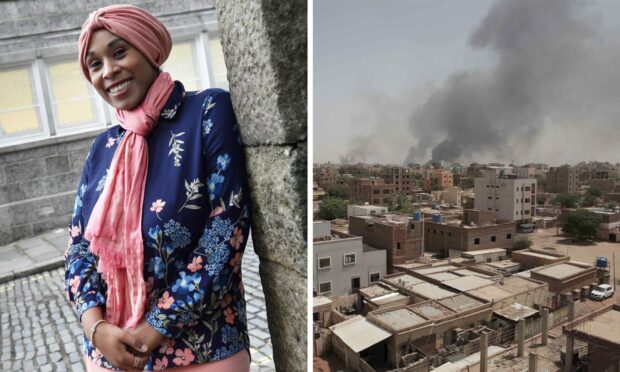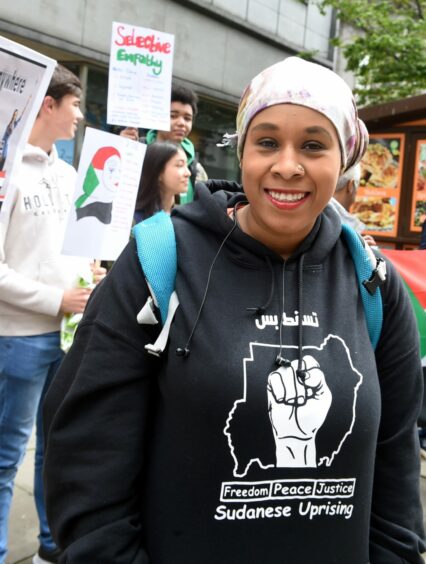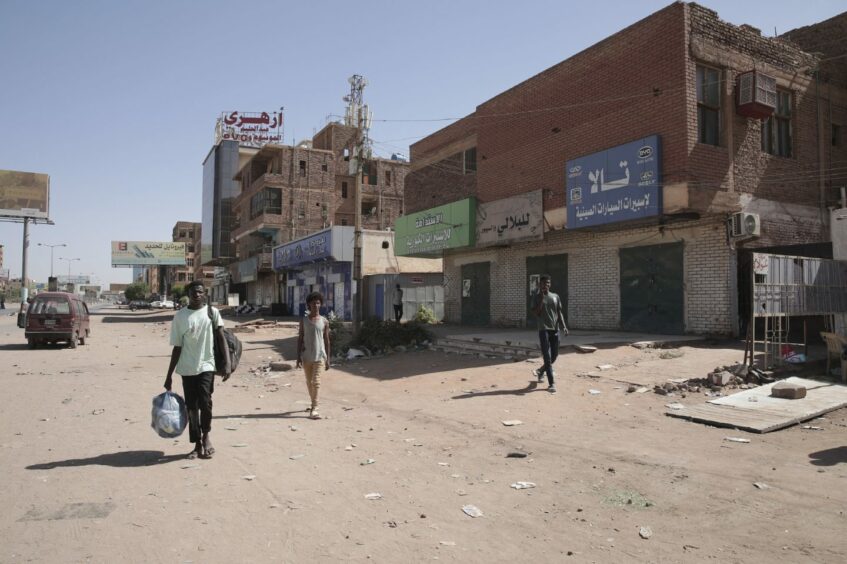An Aberdeen teacher with family in Sudan has said they are “living in hope” that the “nightmare” will come to an end.
Romisa Albashir has not been able to contact family members in Sudan for two days now.
There is currently a tenuous 72-hour ceasefire in place – the fourth attempt to call a truce after fighting broke out in Sudan on April 15.
The British Government is trying to make the most of the window and is evacuating UK nationals.
However, for those from the country, they have very few options.
Violence may not settle ‘any time soon’
Many of Miss Albashir’s family who lived in Sudan’s capital Khartoum have evacuated and have gone to other towns and cities.
Even there she said they are affected by the lack of signal and internet and with banks and hospitals shutting their doors.
Talking to the Press and Journal, the secondary school teacher said: “We’re lucky, in our case, that we do have family in other cities.
“They are living in hope that it will settle down, but that doesn’t seem like that is going to happen any time soon.”
Violence broke out in Sudan 10 days ago between army units loyal to military ruler, Gen Abdel Fattah al-Burhan, and the Rapid Support Forces, led by Mohamed Hamdan Dagalo, known as Hemedti.
The conflict has killed more than 400 people so far. It is believed there have also been around 20,000 new Sudanese refugee arrivals travelling to surrounding countries.
While her friend from Aberdeen who is currently in Sudan might be able to get a flight back to the UK in the ceasefire window Miss Albashir explained those without passports do not have that option.
She said: “A friend of mine from Aberdeen went on holiday, it was meant to be a week and then all this started happening and now she’s just stuck. She’s just one example of many.
“We’re hearing the word ceasefire, but so far it’s just that word.”
It’s a ‘catch-22’
Although people are fleeing the violence in the capital, she described it as a “catch-22” as the internet and phone signals are often worse in these areas.
Miss Albashir: “They cut off the internet for the whole of yesterday, or the day before. It was a whole day we couldn’t reach anyone.
“It’s a catch-22, you either stay in the capital, but, you might get shot, or try to go somewhere else that’s maybe a wee bit safer but you’re almost cutting your arm off because you can’t reach anyone from there.
“It’s just a nightmare – and nightmare doesn’t even cut it.”
Miss Albashir said that most of the fighting is contained within the capital and that even people who are simply going to the hospital for treatment are being targeted.
“My uncle’s friend, I’ve known him my whole life and he gets dialysis three times a week,” she said. “He had to delay it because of everything that’s happening, but it got to the point he had to try and go.
“Sadly, he just got shot dead in the hospital and that’s the situation we’re in.
“It’s a hospital for folk who are getting dialysis treatment, so you’re either there to help the patients or you are a patient – you have nothing to do with anything else. That’s what is at stake if you stay in the capital.”
‘Please care’
The teacher is appealing for people to keep talking about Sudan and to raise awareness about the situation, describing it as “history repeating itself”.
“Can people please care? It feels like we’ve seen this before in other countries and we’ve learned nothing.
“It’s history repeating itself.”
Donald Gillies from Islay is hoping his niece Jennifer, a teacher in Sudan, will be evacuated but said time is running out.
Speaking on BBC Good Morning Scotland, he said she was waiting for a phone call from UK officials about being transferred.
Mr Gillies said: “The planning should have been earlier, the preparation should have been earlier, the movement should have been earlier.”
‘Time is not on our side’
Mr Gillies said that although his niece now stands a better chance of getting out, agencies need to look at the “bigger picture” and the humanitarian issues behind it.
In response the escalating situation, the British Government evacuated British diplomats and their families on Sunday.
They hope to transport a remaining 2,000 UK nationals while the ceasefire is in effect.



Conversation